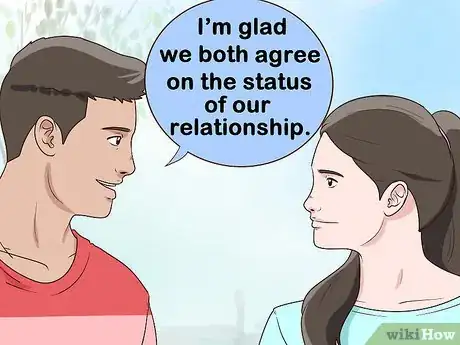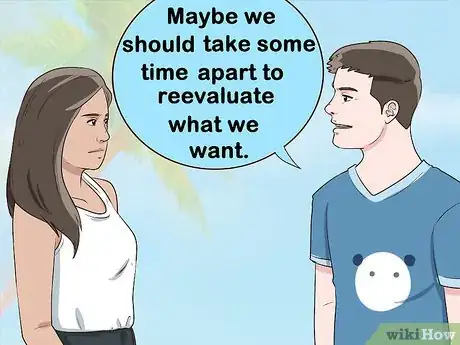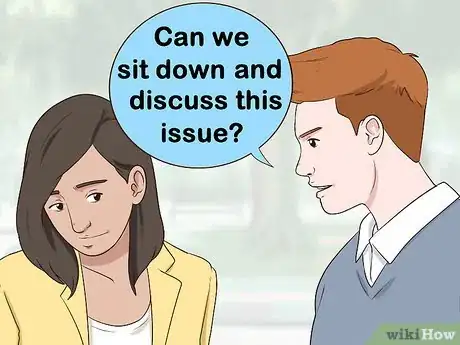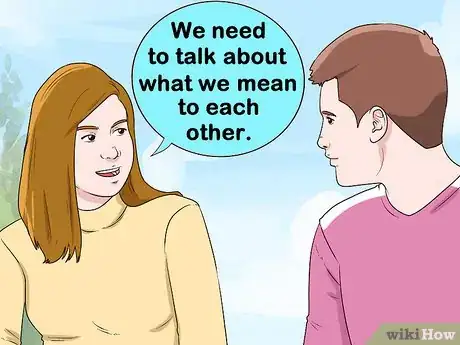This article was co-authored by Trudi Griffin, LPC, MS. Trudi Griffin is a Licensed Professional Counselor in Wisconsin specializing in Addictions and Mental Health. She provides therapy to people who struggle with addictions, mental health, and trauma in community health settings and private practice. She received her MS in Clinical Mental Health Counseling from Marquette University in 2011.
This article has been viewed 31,050 times.
Defining your romantic relationship with your current partner can be tricky, as you may struggle with the appropriate way to bring it up. You may want to define your relationship so you understand the commitment level between you and your partner, and to ensure you are both on the same page. Choose the right time to talk and speak openly to your partner about your status as a couple. You can also observe your partner’s actions and work on maintaining the relationship so it can be fulfilling for you both.
Steps
Speaking to Your Partner
-
1Wait a few dates in to have the talk. Avoid jumping into the talk about defining your relationship right away, on the first date. Give you and your partner time to get to know each other. Go on a few dates and feel each other out. When you start to feel very close and intimate with your partner, it may be time to have a talk about where your relationship is heading.[1]
- You may have to play the timing of the discussion by ear, based on how you are feeling with your partner. Usually after a few dates, you start to get a sense of your partner’s dating history and what you want in the relationship.
- You can also have the discussion before you become intimate with your partner, or after. This is totally up to you and your preferences.
-
2Talk to your partner alone, face to face. Have the discussion in person so you make eye contact with your partner and can gauge how they are feeling. Pick a spot where you can both be alone and comfortable, such as at your apartment or at your partner’s home.[2]
- Avoid having the conversation over text message or social media, as it can be hard to express your feelings properly over text. Go for a face to face conversation instead.
Advertisement -
3Explain how you are feeling about the relationship. Start the conversation by using “I” statements to express to your partner how you are feeling. Share your feelings so they know where you stand. This may help to clarify their own feelings and show them that you have thought a lot about the relationship.[3]
- For example, you may say, “I just want you to know that I am invested in this relationship and want to see where it goes.” Or you may say, “I like seeing you and I want to continue seeing you, just you.”
- You may use terms like “monogamous,” “committed,” or “casual” to describe what you want. Be clear and upfront about what you want from your partner.
-
4Ask them how they feel about the relationship. Let your partner know that it is important to you that you both define the relationship. Get them to open up about their perspective with probing questions or encouraging statements.[4]
- For example, you may say, “I know this can be awkward to talk about but I just wondered where you see this relationship going.” Or you may say, “‘I’m wondering how you are feeling about us. Please be honest.”
-
5Listen to what your partner has to say. Once you have expressed where you stand and asked for their perspective, make sure you really listen to what they have to say. Nod and make eye contact with them so they know you are listening. Avoid the urge to interrupt them. Instead, hear them out.[5]
- Your partner may respond positively and give you the answer you want. Or they may give you an answer that is different than what you want from the relationship. Be prepared for either scenario.
-
6Share your expectations for the relationship. Let your partner know exactly what you want out of the relationship and why. For example, if you want a monogamous relationship, then you might want to let your partner know this and explain why monogamy is important to you. You could also let them know that you value trust and honesty in a relationship, and explain why these are so important to you.
-
7Move forward together if you both agree on the terms of the relationship. After the discussion, you may both be ready to be monogamous with each other. Or you may both agree to keep things casual and open. As long as you are both on the same page, you should be able to move forward with your relationship.
- For example, you may say, “I’m glad we both agree on the status of our relationship. This makes moving forward together much easier.”
- Make sure to define what a monogamous relationship means to you. For example, does monogamy mean that you can only date each other? Is it okay to flirt with other people? How often do you expect to see your partner if you are monogamous?
-
8Take some time to reconsider things if your definitions are very different. If you and your partner are not on the same page, you may need time apart from them to reevaluate the relationship. You can then think about whether you still want to see the person or should break it off with them.
- For example, you may say to your partner, “I don’t think we’re on the same page about our relationship. Maybe we should take some time apart to reevaluate what we want.”
- Don’t sacrifice your goals and values as a way to stay in a relationship.
Observing Your Partner’s Actions
-
1Notice if your partner goes on dates with other people. You can get a sense of what your relationship means to your partner by observing their actions and decisions. If they are seeing other people while you are dating, this likely means they do not see your relationship as exclusive. They may not be too invested in the relationship and want to keep it casual.[6]
- If this is something you and your partner have agreed on, this may not bother you. You may be fine with keeping the relationship casual or open.
- If this bothers you, you may need to have a more in depth discussion about your relationship with your partner.
-
2Look at how your partner treats you around their friends and family. Notice if your partner is quick to introduce you to his friends and family. They may invite you to group hang outs with friends or suggest you meet their parents for dinner. These are usually signs they are interested in a more committed relationship with you and are taking it seriously.[7]
- Notice if your partner is the one suggesting that you spend time with their friends and family on a regular basis. This may mean they are trying to let you know that they value the relationship and want the relationship to be committed.
- Pay attention to how your partner reacts when you suggest spending time around your friends and family as well.
-
3Pay attention to how much time and energy your partner puts into the relationship. Maybe your partner spends a lot of time planning your dates or they text you at least once a day. They may make an effort to see you several times a week and check in on you regularly. These are usually signs that your partner wants the relationship to feel meaningful and that they like spending time with you on a regular basis.[8]
- Keep in mind the only sure why you will know how committed your partner is to the relationship is to ask them and have a discussion about it.
Maintaining Your Relationship
-
1Keep communication open and honest. Don’t be afraid to share your true feelings with your partner. A healthy relationship is one in which you both feel you can tell each other how you are feeling and listen to each other’s thoughts with respect.[9]
- You can keep communication open and honest by asking your partner, “How are you?” or saying, “Tell me what you’re thinking.” Listen to what they have to say without judgement. Then, do the same with them.
-
2Discuss issues or problems with your partner right away. Do not let issues or problems fester in your relationship. Bring them to the forefront so you can discuss them together. Try not to ignore issues you are having or brush them under the rug. This will usually only make the situation worse.[10]
- For example, you may say to your partner, “I have an issue with how much time you are spending with your friends, can we talk about it?” or “I’m struggling to communicate with you, can we sit down and discuss this issue?”
-
3Address unmet needs as soon as possible. If you do not feel like your needs are being met in your current relationship, then it is important to address this issue as soon as possible. Watch for signs that you are not getting your needs met in the relationship. Some of these signs may include:[11]
- Experiencing a decline in health.
- Avoiding your partner.
- Feeling drained or tired much of the time.
- Feeling like you cannot share important things with your partner.
- Having constant tension between you and your partner.
- Not getting enough quality time with your partner.
- Having a basic disconnect in principles or values between you and your partner.
-
4Revisit the status of your relationship, if needed. Relationships evolve and change over time. You and your partner may need to revisit the definition of your relationship, especially if your feelings have shifted or changed. Sit down and discuss this issue face to face. Be honest and work together to come up with a new definition for your relationship together.[12]
- For example, you may say to your partner, “I think we need to sit down and reevaluate our commitment to each other” or “I feel like our relationship has shifted and we need to talk about what we mean to each other.”
References
- ↑ https://www.hercampus.com/love/dating/how-dtr-define-relationship
- ↑ https://www.hercampus.com/love/dating/how-dtr-define-relationship
- ↑ http://www.cosmopolitan.com/sex-love/advice/a53438/ask-logan-define-the-relationship/
- ↑ http://www.cosmopolitan.com/sex-love/advice/a53438/ask-logan-define-the-relationship/
- ↑ http://www.anewmode.com/dating-relationships/how-to-have-the-talk-to-define-your-relationship/
- ↑ https://www.psychologytoday.com/blog/rediscovering-love/201602/10-questions-help-you-tell-if-youre-ready-commit
- ↑ https://www.psychologytoday.com/blog/rediscovering-love/201602/10-questions-help-you-tell-if-youre-ready-commit
- ↑ https://www.psychologytoday.com/blog/rediscovering-love/201602/10-questions-help-you-tell-if-youre-ready-commit
- ↑ http://www.apa.org/helpcenter/healthy-relationships.aspx








































































